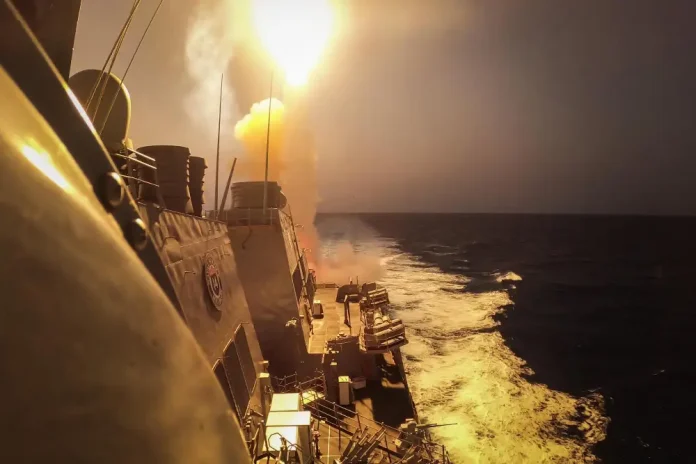Britain and the US have launched air and sea strikes on Houthi military installations in Yemen in response to the movement’s attacks on ships in the Red Sea, in a dramatic regional expansion of the war between Israel and Hamas in Gaza.
US officials and the US Air Force said the strikes carried out overnight by US and British forces targeted 16 Houthi targets, including radar installations, storage and launch sites for drones, cruise and ballistic missiles. Joe Biden said:
These targeted strikes are a clear message that the United States and our partners will not tolerate attacks on our personnel or allow hostile actors to imperil freedom of navigation.
Iran, which supports the Houthis, strongly condemned the attacks. A Houthi spokesman said there was no justification for the attacks and that the group would continue to attack ships travelling to Israel.
In a televised speech earlier Thursday, Houthi leader Abdul Malik Al-Houthi vowed a “big” response to the US and its allies if they proceeded with military action against his group. He said:
We’ll confront the American aggression. Any American attack won’t go unpunished.
Russia has requested an urgent meeting of the UN Security Council to discuss the military strikes.
British Prime Minister Rishi Sunak called the move a “limited, necessary and proportionate measure” after weeks of “dangerous and destabilising attacks” by Houthi against shipping in the Red Sea.
US Defence Secretary Lloyd Austin, who is hospitalised due to complications from the operation, said the strikes targeted Houthi forces and assets, including drones, ballistic and cruise missiles, coastal radars and air surveillance assets.
The US said Australia, Bahrain, Canada and the Netherlands supported the operation and sought to portray the strikes as part of an international effort to restore the free flow of trade on the key route between Europe and Asia, which accounts for about 15 per cent of global shipping. Andreas Krieg at King’s College in London warned of the risk that Saudi Arabia and the United Arab Emirates could also be drawn into the confrontation. He said:
The concern is that this could escalate.
In a statement after the strikes, Saudi Arabia called for restraint and “avoiding escalation”.
The United States also accused Iran of operational involvement in the Houthi attacks in the Red Sea, providing military capabilities and intelligence to carry them out. A senior US official told reporters.
We believe that they have been certainly involved in every phase of this.
Aircraft, ships and submarines carried out the strikes. According to another US official, the strikes targeted more than a dozen locations and were aimed at weakening Houthi military capabilities rather than being purely symbolic. A US military official said:
We were going after very specific capability in very specific locations with precision munitions.
The Houthis say their attacks on shipping routes in the Red Sea are a show of support for the Palestinians and the Islamist group Hamas, which controls the Gaza Strip. The Houthi attacks have disrupted international trade, forcing international ships to take the long route around South Africa to avoid being hit. Rising shipping costs have fuelled fears it could spark a fresh bout of global inflation. The US says the Houthis have attempted 27 attacks on commercial shipping since Nov. 19.
Israel has launched a military offensive that has killed more than 23,000 Palestinians in Gaza since Hamas attacked Israel on 7 October, killing 1,200 people and kidnapping 240.
